7 books about Goodstein, Eban

The Carbon Control Knob
Richard Alley
Island Press, 2012
On November 2, 2011, Richard Alley participated in The National Climate Seminar, a series of webinars sponsored by Bard College’s Center for Environmental Policy. The online seminars provide a forum for leading scientists, writers, and other experts to talk about critical issues regarding climate change. The series also opens a public conversation, inviting participants to ask questions and contribute their own thoughts.
Dr. Alley conducts research on the paleoclimatic record at The Pennsylvania State University in order to understand the history, and perhaps the future, of climate change. In his lecture, Alley gave a concise overview of why we know what we know about climate change, and what that evidence can tell us about today’s warming planet. Alley not only provides an accessible science lesson, but reveals his own greatest concerns about climate change and offers advice to those who want to stop debating the subtleties of climate science and act now.
This E-ssential is an edited version of Alley’s talk and the subsequent question and answer session. While some material has been cut and some language modified for clarity, the intention was to retain the substance of the original discussion.
Dr. Alley conducts research on the paleoclimatic record at The Pennsylvania State University in order to understand the history, and perhaps the future, of climate change. In his lecture, Alley gave a concise overview of why we know what we know about climate change, and what that evidence can tell us about today’s warming planet. Alley not only provides an accessible science lesson, but reveals his own greatest concerns about climate change and offers advice to those who want to stop debating the subtleties of climate science and act now.
This E-ssential is an edited version of Alley’s talk and the subsequent question and answer session. While some material has been cut and some language modified for clarity, the intention was to retain the substance of the original discussion.
[more]
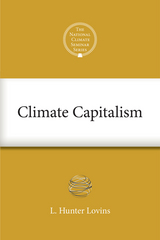
Climate Capitalism
L. Hunter Lovins
Island Press, 2012
On October 5, 2011, L. Hunter Lovins participated in The National Climate Seminar, a series of webinars sponsored by Bard College’s Center for Environmental Policy. The online seminars provide a forum for leading scientists, writers, and other experts to talk about critical issues regarding climate change. The series also opens a public conversation, inviting participants to ask questions and contribute their own thoughts.
Lovins is President and founder of Natural Capitalism Solutions (NCS / www.natcapsolutions.org). NCS works with businesses, governments, and civil society to develop practices that are sustainable for both people and the environment. Her lecture focused on ways that the United States can pull itself out of the current recession, while preserving natural and human capital.
This E-ssential is an edited version of Lovins’ talk and the subsequent question and answer session. While some material has been cut and some language modified for clarity, the intention was to retain the substance of the original discussion.
Lovins is President and founder of Natural Capitalism Solutions (NCS / www.natcapsolutions.org). NCS works with businesses, governments, and civil society to develop practices that are sustainable for both people and the environment. Her lecture focused on ways that the United States can pull itself out of the current recession, while preserving natural and human capital.
This E-ssential is an edited version of Lovins’ talk and the subsequent question and answer session. While some material has been cut and some language modified for clarity, the intention was to retain the substance of the original discussion.
[more]
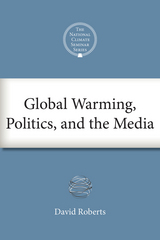
Global Warming, Politics, and the Media
David Roberts
Island Press, 2012
On September 21, 2011, David Roberts participated in The National Climate Seminar, a series of webinars sponsored by Bard College’s Center for Environmental Policy. The online seminars provide a forum for leading scientists, writers, and other experts to talk about critical issues regarding climate change. The series also opens a public conversation, inviting participants to ask questions and contribute their own thoughts.
Roberts is a Senior Staff Writer at Grist, one of the web’s most popular sites for environmental news and commentary, so he is distinctively qualified to discuss the relationship between global warming, politics, and the media. In his lecture, Roberts argued that environmentalists’ traditional criticism of climate change coverage—namely that journalists describe global warming as a debatable theory rather than as fact—is no longer the issue. Most media accept the reality of climate change—but it is treated as a specialty issue, rather than as a phenomenon that affects myriad aspects of life. The seminar focused on how to change that perception—how to make climate a backdrop to the political debates that affect real change.
This E-ssential is an edited version of Roberts’ talk and the subsequent question and answer session. While some material has been cut and some language modified for clarity, the intention was to retain the substance of the original discussion.
Roberts is a Senior Staff Writer at Grist, one of the web’s most popular sites for environmental news and commentary, so he is distinctively qualified to discuss the relationship between global warming, politics, and the media. In his lecture, Roberts argued that environmentalists’ traditional criticism of climate change coverage—namely that journalists describe global warming as a debatable theory rather than as fact—is no longer the issue. Most media accept the reality of climate change—but it is treated as a specialty issue, rather than as a phenomenon that affects myriad aspects of life. The seminar focused on how to change that perception—how to make climate a backdrop to the political debates that affect real change.
This E-ssential is an edited version of Roberts’ talk and the subsequent question and answer session. While some material has been cut and some language modified for clarity, the intention was to retain the substance of the original discussion.
[more]
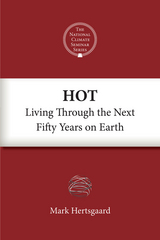
Hot
Living Through the Next Fifty Years on Earth
Mark Hertsgaard
Island Press, 2012
On December 7, 2011, Mark Hertsgaard participated in The National Climate Seminar, a series of webinars sponsored by Bard College’s Center for Environmental Policy. The online seminars provide a forum for leading scientists, writers, and other experts to talk about critical issues regarding climate change. The series also opens a public conversation, inviting participants to ask questions and contribute their own thoughts.
Hertsgaard has spent the last two decades reporting on climate change for media outlets including The New Yorker, NPR, Time, Vanity Fair, and The Nation, where he is the environment correspondent. His lecture focused on political movements and how environmental advocates can provoke change in public attitudes and on Capitol Hill. Hertsgaard sees 2011’s Occupy movement as a sign of real hope and discussed what climate activists can learn from Occupy’s tactics.
This E-ssential is an edited version of Hertsgaard’s talk and the subsequent question and answer session. While some material has been cut and some language modified for clarity, the intention was to retain the substance of the original discussion.
Hertsgaard has spent the last two decades reporting on climate change for media outlets including The New Yorker, NPR, Time, Vanity Fair, and The Nation, where he is the environment correspondent. His lecture focused on political movements and how environmental advocates can provoke change in public attitudes and on Capitol Hill. Hertsgaard sees 2011’s Occupy movement as a sign of real hope and discussed what climate activists can learn from Occupy’s tactics.
This E-ssential is an edited version of Hertsgaard’s talk and the subsequent question and answer session. While some material has been cut and some language modified for clarity, the intention was to retain the substance of the original discussion.
[more]
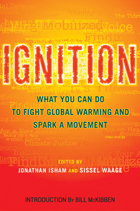
Ignition
What You Can Do to Fight Global Warming and Spark a Movement
Edited by Jonathan Isham and Sissel Waage
Island Press, 2007
The evidence is irrefutable: global warming is real. While the debate continues about just how much damage spiking temperatures will wreak, we know the threat to our homes, health, and even way of life is dire. So why isn’t America doing anything? Where is the national campaign to stop this catastrophe?
It may lie between the covers of this book. Ignition brings together some of the world’s finest thinkers and advocates to jump start the ultimate green revolution. Including celebrated writers like Bill McKibben and renowned scholars like Gus Speth, as well as young activists, the authors draw on direct experience in grassroots organization, education, law, and social leadership. Their approaches are various, from building coalitions to win political battles to rallying shareholders to change corporate behavior. But they share a belief that private fears about deadly heat waves and disastrous hurricanes can translate into powerful public action.
For anyone who feels compelled to do more than change their light bulbs or occasionally carpool, Ignition is an essential guide. Combining incisive essays with success stories and web resources, the book helps readers answer the most important question we all face: “What can I do?”
[more]
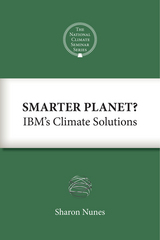
Smarter Planet?
IBM's Climate Solutions
Sharon Nunes
Island Press, 2012
On October 19, 2011, Sharon Nunes participated in The National Climate Seminar, a series of webinars sponsored by Bard College’s Center for Environmental Policy. The online seminars provide a forum for leading scientists, writers, and other experts to talk about critical issues regarding climate change. The series also opens a public conversation, inviting participants to ask questions and contribute their own thoughts.
Sharon Nunes is Vice President of the Smarter Cities Strategy & Solutions program at IBM, working with municipal leaders to manage urban systems more efficiently. In her lecture, Nunes discussed the ability of smart grids and other information technology to save energy, time, and costs. Questions focused on the barriers to implementing these systems, and Nunes addressed ongoing challenges as well as successful programs.
This E-ssential is an edited version of Nunes’ talk and the subsequent question and answer session. While some material has been cut and some language modified for clarity, the intention was to retain the substance of the original discussion.
Sharon Nunes is Vice President of the Smarter Cities Strategy & Solutions program at IBM, working with municipal leaders to manage urban systems more efficiently. In her lecture, Nunes discussed the ability of smart grids and other information technology to save energy, time, and costs. Questions focused on the barriers to implementing these systems, and Nunes addressed ongoing challenges as well as successful programs.
This E-ssential is an edited version of Nunes’ talk and the subsequent question and answer session. While some material has been cut and some language modified for clarity, the intention was to retain the substance of the original discussion.
[more]

The Trade-Off Myth
Fact And Fiction About Jobs And The Environment
Eban Goodstein
Island Press, 2000
Many Americans believe three things about jobs and the environment: that the implementation of environmental protection measures has created ongoing, widespread unemployment; that it has caused large numbers of plant shutdowns and layoffs in manufacturing; and that it has led many U.S. firms to flee to developing countries with lax environmental regulations. Virtually all economists who have studied the issue agree that each of these propositions is false.In The Trade-Off Myth, economist Eban Goodstein provides an in-depth examination of the deep-seated, but ultimately mistaken, American belief in a widespread jobs-environment trade-off. Remarkably, his is the first book to state unambiguously the truth about jobs and the environment. Goodstein offers a readable and accessible analysis of the labor impacts of environmental regulation, as he: considers the roots and staying power of misperceptions regarding job security and environmental regulation analyzes various models used to predict employment impacts, and explains how changes in assumptions can drastically change predicted outcomes lists and debunks, myth-by-myth, widely held perceptions about the impacts of environmental regulation on jobs examines localized hardships caused by environmental protection measures within specific industries and regions, and considers what can be done to mitigate those impacts explores the revisionist view that environmental protection measures can actually create jobs looks at jobs-environment issues that are likely to emerge as we attack the problem of global warming.The Trade-Off Myth presents in clear, accessible language the consensus of economists who have examined the jobs-environment issue, and offers the first comprehensive look at the truth behind the myths that pervade discourse on environmental regulation. It will be essential reading for environmentalists, concerned citizens, policymakers, public officials, and anyone involved with debates over strengthening environmental regulations.
[more]
READERS
Browse our collection.
PUBLISHERS
See BiblioVault's publisher services.
STUDENT SERVICES
Files for college accessibility offices.
UChicago Accessibility Resources
home | accessibility | search | about | contact us
BiblioVault ® 2001 - 2024
The University of Chicago Press









